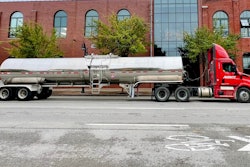Motor carriers should proactively set their own terms and conditions in relationships with shippers and brokers through a standard bill of lading and other mechanisms, attorney Henry Seaton told trucking executives at the 2003 Randall Trucking Symposium. “These kinds of conditions are the ounce of cure that prevents a pound of trouble,” Seaton said. He cited as an example fuel surcharge clauses, which helped many carriers avoid a cash crunch when diesel fuel prices soared this winter.
Seaton advocates a system he designates as CoWS: conditions, website, stamps. “Have the service conditions,” he said. “Once you have them, post it on your website. Then put on a stamp that says ‘terms of service apply.'” Seaton said the cost of such stamps would easily pay for themselves by preventing cargo collection issues. Seaton advises carriers to get a simple contract that includes, by reference, existing commercial rules. Also, the standard bill of lading and the carrier’s own terms of service should be specifically incorporated.
After a carrier sets its terms of service, it must be careful not to give away its rights in freight contracts. Carriers should watch out for dangerous clauses, such as those that make the carrier responsible for all damages and accidents, even if they were the shipper’s fault. These clauses, which Seaton calls “the dirty dozen,” involve:
- Waivers under Sec. 14101(b)
- Indemnity
- Special and consequential damages
- Additional insured
- Right of offset
- Salvage/no duty to mitigate
- Shipper load and count/concealed damages
- No penalties for non-payment of freight charges
- Homer provisions/arbitration
- Integration clauses
- Nonrecouse provision (in broker contracts)
- Back solicitation provision
Finally, Seaton said, it’s critical that carriers enforce provisions in two areas that they often pay little attention to. They need to enforce the standard released evaluation to limit cargo claims, and they need to enforce credit and collection provisions to ensure timely payment.






